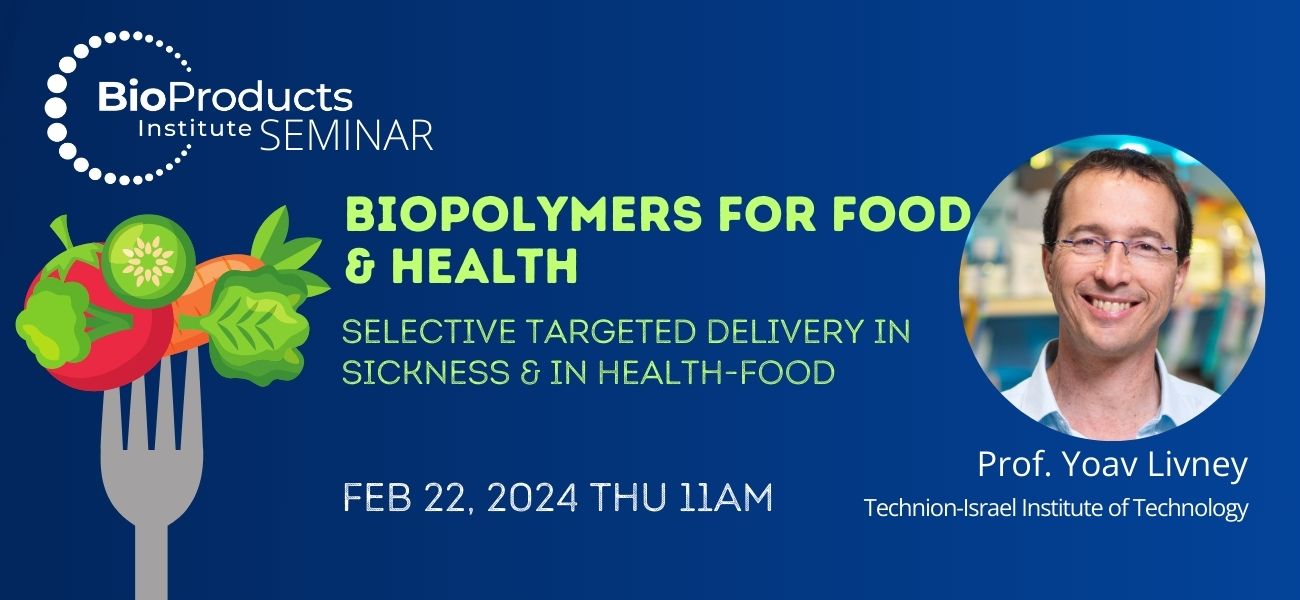BPI Seminar by Prof. Yoav Livney
February 22, 2024, 11:00 am to 12:00 pm
TITLE
Biopolymers for Food and Health: Selective Targeted Delivery in Sickness and in Health-Food
LOCATION: KAIS #2020 on the 2nd Floor of Fred Kaiser Building located at 2332 Main Mall, Vancouver, BC V6T 1Z4
ABOUT THE EVENT
Join us in welcoming Professor Yoav Livney, an expert in food engineering from Technion. Dive into the world of biopolymers for food and health with focus on the intricate selective targeted delivery process. Explore the importance of alternative protein research and get an insider's look at the innovative projects underway at the Sustainable Protein Research Center.
AGENDA
- Introduction by Prof. Simcha Srebnik
- Keynote by Prof. Yoav Livney, Technion Israel Institute of Technology
- Q&A / Discussion
ABOUT THE SPEAKER
Prof. Yoav D. Livney [B.Sc. (Suma cum Laude, 1990) Food Engineering & Biotechnology, Technion Israel Institute of Technology; M.S. (1995) Food Engineering, UW Madison, Wisconsin, USA; PhD (2002) Food Engineering & Biotechnology Technion IIT; Post-Doc Food Science, University of Guelph, Canada], Head of the Lab of Biopolymers for Food & Health at the Biotechnology and Food Engineering department, Technion IIT [2004- Lecturer; 2007- Asst. Professor, 2012-20 Assoc. Prof., 2020- Full Professor] is an expert in biopolymers, delivery systems for nutraceuticals and drugs, and alternative proteins. Authored over 80 publications cited over 7,900 times, H-index=43. He has 9 patents, gave ~60 invited & keynote talks at international conferences, and mentored 15 MSc and 10 PhD students. He is an Editorial-Board Member in several reputed journals. Prof. Livney is leading the establishment of the “Technion Sustainable Protein Research Center”.
ABSTRACTS
Prof. Livney's lab focuses on biopolymers for food and health. They harness biopolymers for targeted delivery of health- promoting compounds for treating cancer, and for preventing diseases via dietary interventions. They also promote global sustainability and food security by developing novel alternatives to animal-based foods, based on biopolymers from new and renewable sources.
Project Highlights
1. Novel targeted multifunctional nanoparticles for prostate cancer treatment
Prostate cancer (PC) is the 2nd most common cancer in men. Current treatment of PC includes a combination of systemic androgen deprivation therapy (ADT) and chemotherapy. The efficacy of systemic ADT and chemotherapy is limited due to low solubility and lack of tumor specificity causing toxic side effects, and frequent emergence of drug-resistance. We developed novel selectively PC-targeted nanoparticles (NPs): PEGylated nanostructured lipid carriers decorated with a selective ligand, targeted to prostate-specific membrane antigen (PSMA) receptor, and harboring an ADT agent or a cytotoxic drug. The NPs enter PC cells via receptor-mediated endocytosis, thereby evading multidrug resistance efflux transporters. The ~150nm NPs showed outstanding drug loading, sustained release and extremely high selective cytotoxicity with IC50 of ~4 pM. This nano-delivery platform bears a promise of enhanced efficacy and minimal untoward toxicity, for improved survival rate and patient quality of life. (DOI: 10.3390/pharmaceutics14010088)
2. Oligosaccharide-lactoferrin particles for selective targeting of proteins to probiotic bacteria in the gut
Consumption of prebiotics promotes gut-probiotics, for improving human-health. Current prebiotics are certain indigestible carbohydrates. However, high competition exists among gut-microbes for the scarce protein in the colon, as most consumed protein is absorbed in the small-intestine. Still, no protein-containing-prebiotics are commercially-available. We developed and evaluated in-vivo the next-generation prebiotics: protein-containing-prebiotics, for selectively-targeted delivery of protein to colonic-probiotics, to boost their growth. This system is based on micellar-particles of Maillard-conjugates of 2’-Fucosyllactose (2’-FL) shell, engulfing lactoferrin peptic-then-tryptic hydrolysate (LFH). This core-shell structure lowers protein-core digestibility, while the prebiotic-glycans are hypothesized to serve as ligands for targeting probiotics. Mice were fed either with 2’-FL-LFH Maillard-conjugates, with the unconjugated-components as conventional-prebiotic control, or with saline as blank. Consumption of 2’-FL-LFH significantly increased the colonic-concentration of short-chain-fatty-acids (SCFAs), compared to the unconjugated-components or to saline, by raising the levels of SCFAs-producing bacterial-families. Plasma lipopolysaccharide levels, indicating higher gut-permeability, were significantly lower in the 2’-FL-LFH group vs. the controls. 2’-FL-LFH may beneficially modulate the composition and metabolic-activity of gut-microbes, thereby contributing to host-health more effectively than carbohydrate-only prebiotics.
(DOI: 10.1002/pat.4658; DOI: 10.1016/j.foodhyd.2021.106973; DOI: 10.1016/j.foodres.2023.113830)
3. Three dimensionally printed fish analogs from algae.
With rising Global population, and diminishing land and water resources, the oceans may serve as an important sustainable food source (DOI: 10.1016/j.foodhyd.2018.07.047; DOI: 10.1016/j.foodhyd.2021.106892). Macroalgae are highly nutritious. We co-extracted proteins and carbohydrates from gracilaria, a red seaweed, and used 3D-printing to form a prototype salmon fillet, using microalgal astaxanthin for the typical salmon color.
4. The Technion Sustainable Protein Research Center (SPRC)
The demand for animal products, which grows faster than the global population is unsustainable, calling for intensive R&D for alternatives to animal-based products. Supported by GFI, The Technion has established the first-in-the-world academic Sustainable Protein Research Center, of which I am in the leading team, to address these challenges. Over 33 researchers from more than 10 faculties are cooperating within this center.
